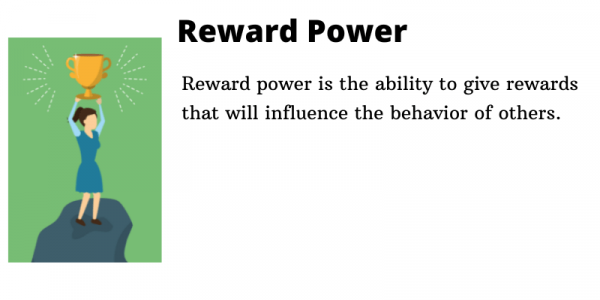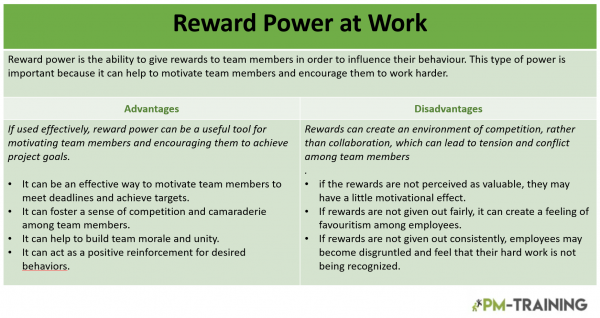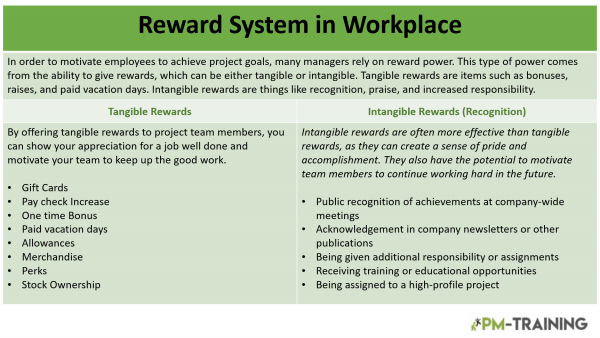Leadership reward power is the ability of a project manager to give rewards to team members in order to influence their behaviour. This type of power is important because it can help to motivate team members and encourage them to work harder.
The use of reward power is not without its risks, however. If rewards are not given fairly and transparently, they can create conflict and resentment among team members. If rewards are given too frequently, team members may become reliant on them and may be less motivated to work hard when they are not receiving rewards.
There is no question that reward power is important in project management. The ability to offer rewards to employees and other project stakeholders can be a key motivator in ensuring the successful completion of a project.
Reward power is the ability to give rewards that will influence the behavior of others. In project management, reward power is often used to motivate team members to achieve project goals.
However, not all rewards are created equal. To be effective, rewards must be meaningful to the recipient and aligned with the objectives of the project. With this in mind, it is important to carefully consider what types of rewards will be most effective in motivating project stakeholders.
While reward power is not always explicitly stated, it is an important dynamic to consider when forming and leading a project team. This is because the use of rewards can be a highly effective way to motivate team members and improve project outcomes.

Reward Power in project management cannot be understated. By using rewards wisely, project managers can increase employee motivation and encourage them to work harder to achieve project goals.
This could be in the form of a raise, bonus, or promotion.
Reward power is most effective when used in conjunction with other forms of power. For example, if you have the reward power to give a raise, but the person you are trying to motivate does not have the motivation to achieve the goal, then the reward power will not be effective.
Some rewards that can be given for completing tasks or goals include money, time off, recognition, and privileges.
The type of reward that is given should be based on what will motivate the individual to achieve the task or goal. For example, someone who is working on a project to get a promotion may be motivated by the possibility of earning more money.
When used sparingly and strategically, rewards can be a powerful tool to help project managers get the most out of their teams. With that said, it is important to use rewards wisely and not overuse them, as this can lead to employees becoming demotivated or feeling entitled.
Reward Power Advantages and Disadvantages
Advantages
There are many different ways to motivate and encourage team members in project management.
For example, it can help to create a sense of ownership and commitment to the project. Furthermore, reward power can also be used to encourage team members to work together cooperatively.
Some of the advantages of using reward power in project management include:
- It can be an effective way to motivate team members to meet deadlines and achieve targets.
- It can foster a sense of competition and camaraderie among team members.
- It can help to build team morale and unity.
- It can act as a positive reinforcement for desired behaviors.
If used effectively, reward power can be a useful tool for motivating team members and encouraging them to achieve project goals.
However, it is important to use reward power judiciously, as too much or too little can lead to negative consequences. If you are considering using reward power in your project management, be sure to weigh the pros and cons carefully to ensure that it is the right decision for your team.

Disadvantages
While reward power can be effective in motivating employees and driving results, there are also some potential disadvantages to using this type of power.
Incentivizing employees or teams with rewards is a common practice in project management. While this can be an effective way to motivate people, there are also some potential disadvantages to using rewards as a form of motivation.
- For one, rewards can create a sense of entitlement among employees. When employees feel entitled to rewards, they may become less motivated to do their best work.
if the rewards are not perceived as valuable, they may have a little motivational effect.
- If rewards are not given out fairly, it can create a feeling of favoritism among employees.
- If rewards are not given out consistently, employees may become disgruntled and feel that their hard work is not being recognized.
- If rewards are given out for tasks that are not truly important to the success of the project, it can create a feeling of padding the project with busy work.
- Additionally, rewards can also create an environment of competition, rather than collaboration, which can lead to tension and conflict among team members.
Ultimately, whether or not to use rewards as a form of motivation is a decision that should be made on a case-by-case basis. There is no right or wrong answer, but it is important to be aware of the potential drawbacks of using rewards before making a decision.
Utilizing Leadership Reward Power with a Team
When using reward power, it is important to keep the following in mind.
Decide what behavior you want to encourage
It is important to understand what you want and the behavior you want to promote so that reward power can be used effectively.
Use rewards as a way to encourage positive behavior, not as a bribe
The rewards should only be used to promote positive behavior and should not be used as a bribe to get work done. Rewards are earned for good behaviour while bribes are offered to stop bad behavior.
Make sure the rewards are given in a timely manner
To keep the team motivated and it is good to have a proper schedule for rewarding.
Choose a reward that will motivate your team
The reward should be chosen such that on receiving the reward recipient is motivated to continue doing the good work
Make sure the reward is something that can be given immediately after the desired behavior is displayed.
Also, Make sure the rewards you offer are something that your team members value. If you’re not sure what they value, ask them!
Be consistent in your use of reward power
It is important to continue rewarding good behavior without a miss so that the people are motivated to do the work.
Be aware of the potential downside of using reward power
There can be downsides to using reward power such as creating a dependency on rewards or coming across as manipulative. Solutions to these problems should be planned ahead.
Make sure the rewards are meaningful to the recipients
Rewards must be chosen based on the recipient’s motivation factor. To continuously motivate people it is important to choose rewards that are meaningful. If you follow these tips, you can use reward power to help motivate and engage your team.
Tangible and Intangible Reward Examples
In order to motivate employees to achieve project goals, many managers rely on reward power. This type of power comes from the ability to give rewards, which can be either tangible or intangible. Tangible rewards are items such as bonuses, raises, and paid vacation days. Intangible rewards are things like recognition, praise, and increased responsibility.
Both types of rewards can be effective in motivating employees. However, it is important to choose the right type of reward for the situation. For example, tangible rewards may be more effective when the goal is something that can be easily measured, such as increased sales. Intangible rewards may be more effective when the goal is something more abstract, such as improving customer satisfaction.
No matter what type of rewards you use, be sure to give them in a timely manner. Employees who achieve a goal should be rewarded as.

By offering tangible awards to project team members, you can show your appreciation for a job well done and motivate your team to keep up the good work. But what are some good examples of tangible awards you can give to your team?
Tangible Reward at Work
One option is to give out gift cards. This is a great way to show your appreciation and let your team members choose their own rewards. Another option is to give out bonuses or raises. This is a great way to show your team that you are invested in their success and that you are willing to put your money where your mouth is.
For example, if employees are working on a project that is dangerous or strenuous, offering a reward for completing the project may be more likely to motivate them than simply offering a paycheck. In addition, rewards can be used to recognize employees for a job well done or to incentivize them to reach a certain goal.
Intangible Recognition Workplace
Rewards are a powerful tool that project managers can use to motivate team members and encourage positive behaviors. However, not all rewards need to be tangible. In fact, sometimes the most effective rewards are those that are intangible.
Intangible rewards are often more effective than tangible rewards, as they can create a sense of pride and accomplishment. They also have the potential to motivate team members to continue working hard in the future.
In addition to a feeling of satisfaction and accomplishment, employees often seek recognition for their hard work.
Examples of intangible rewards that can be used to recognize and motivate employees to include:
• Public recognition of achievements at company-wide meetings
• Acknowledgement in company newsletters or other publications
• Being given additional responsibility or assignments
• Receiving training or educational opportunities
• Being assigned to a high-profile project
Intangible rewards are often more impactful than tangible ones because they are personalized and can be tailored to each individual. They also have the added benefit of being less expensive than tangible rewards.
Just remember these two key features when doing an Intangible award
Recognition
A simple “thank you” can go a long way. Recognizing your team members for their hard work and achievements is a great way to show them that you appreciate their efforts.
Responsibility
Giving team members more responsibility is a great way to show trust and faith in their abilities. This can be a great move.
FAQs Workplace Reward Power
What is Reward Power in Project Management?
Reward power is the ability to give rewards in exchange for good behavior or performance. This type of power is often used by managers and leaders to motivate their team members. If used effectively, reward power can be a great way to improve team performance and productivity.
What are the main differences between Tangible and Intangible awards?
There are many different types of rewards that you can give to team members. Some rewards are tangible, like bonuses or gift cards. But there are also intangible rewards, like public recognition or increased responsibility.
What are some good tips when using Reward Power in Project Management?
Offer what you are actually motivating to the team members. Be consistent with the rewards you offer – if team members don’t receive rewards when they achieve objectives, they’ll likely be less motivated to continue performing at a high level. Finally, use reward power prudently – too much reward power can create a sense of entitlement among team members.
What kind of Reward can you give to your team?
Publicly recognizing employees for their good work is a key way to show them that their efforts are appreciated. Also giving employees responsibility for key tasks shows them that you trust them to get the job done and can help them to feel more invested in the company. Also, this can be done in the form of bonuses, raises, or even spot bonuses for a job well done
